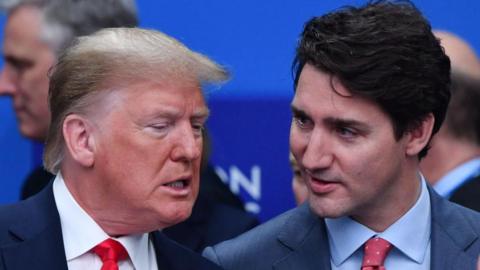Speaking in the House of Commons in Ottawa, Trudeau told lawmakers that "the idea of going to war with the United States isn’t what anyone wants".
He called on them to not "panic", and to work together.
"That is the work we will do seriously, methodically. But without freaking out,” he said.
The leaders of Canadian provinces suggested that they would impose their own tariffs on the US.
"The things we sell to the United States are the things they really need," Deputy Prime Minister Chrystia Freeland said on Tuesday. "We sell them oil, we sell them electricity, we sell them critical minerals and metals."
America's northern neighbour accounted for some $437bn (£347bn) of US imports in 2022, and was the largest market for US exports in the same year, according to US data.
Canada sends about 75% of its total exports to the US.
Doug Ford, the premier of Ontario, Canada's most populous province, said on Monday the proposed tariff would be "devastating to workers and jobs in both Canada and the US".
“To compare us to Mexico is the most insulting thing I’ve ever heard,” said Ford.
Ford was echoed by the premiers of Quebec, Saskatchewan and British Columbia, while a post on the X account of Alberta Premier Danielle Smith acknowledged that Trump had "valid concerns related to illegal activities at our shared border".
The Canadian dollar, the Loonie, has plunged in value since Trump vowed to impose tariffs on Canadian imports come January.
The Canadian dollar dipped below 71 US cents, the lowest level the Loonie has fallen to since May 2020, when Trump threatened to impose tariffs on Canadian goods during his first stint as US president. The Mexican peso fell to its lowest value this year, around 4.8 cents.
